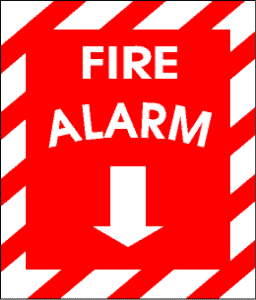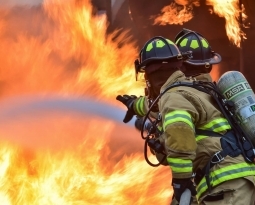Understand Importance Of Fire Alarm System Before You Regret
Why You Need Fire Alarms?
 Many people do not install fire alarms on their places, and they assume that they can smell smoke when the place catches fire and
Many people do not install fire alarms on their places, and they assume that they can smell smoke when the place catches fire and
capable of escaping in case of a fire emergency. It can be dangerous for power stations, oil and gas installations, commercial buildings, government buildings, military camps, homes, etc. to not have fire alarms because many valuable documents and people can be saved on proper time only if they have fire alarms, as fire alarm will give indications on time and they can find a way to escape.
Well, according to an experiment conducted, it has been proven that people’s attention is disrupted when there is a sound or noise, but it is not the case with the smell. Our sense of the smell is not always accurate and cannot smell fire as soon as it starts, people can only smell it when it’s out of control, but fire alarm will recognize smoke which our nose are not capable of smelling.
Many people do not take fire alarms seriously, and many do not test or check their alarm systems regularly. The only thing that can alert you or indicate family, friends, workers, employees 24/7 from a fire is the sound of a well installed and maintained fire alarm system. Fire alarms are necessary because they can give you an early signal to something that could be terrible and deadly, saving your lives and even help to get out of any terrible situation.
A fire alarm alerts you when you are busy, working or sleeping. You can, therefore, take action before major damage takes place, thus saving you the cost of property loss- also saving insurance companies a lot of damage cost.
An early consciousness can get you out of a situation that would potentially turn into a disaster. In any fire emergency, a few seconds can save lives of many people.
How Does It Work?
A fire alarm system is diversification of devices combining to identify and alert people through visual and audio appliances when smoke, fire, carbon monoxide gas or other emergency situations occur. These alarms are provoked from heat detectors and smoke detectors. They can be activated through Manual fire alarm activation devices such as manual call points.
The control panels of smoke alarm systems are the brain of the emergency alarm system, the control panel would be the main connection between your smoke alarm system and the primary station. It would enable anyone to keep track of the circumstance on your premises. Smoke and heat detectors are also important, this is temperamental that depends greatly on the choices and budget that you may have for your smoke alarm system.
In fire alarm system, they have smoke detectors and triggers on the rising temperature of particular location, indicating is there a heat source in that place, naturally the heat detector would analyze the signal and fire that is developing in that area. Some detectors are configured to alarm when they notice a stressing quantity of specific particles or chemicals in the environment, this is a much understandable identifier of the presence of fire in the area.
Types Of Fire Alarms
- Standard/conventional fire alarm system
- Addressable fire alarm system
- Wireless Fire Alarm System
- Analogue Addressable Fire Alarm Systems
- Conventional Fire Alarm Systems – Conventional fire alarm systems are all wired to the same cable with its components that connects them to a fire alarm control panel. The control panel displays a signal when these components activate. These types of systems are inexpensive and work well in small facilities. The problem with conventional fire alarm systems is that when a fire alarm component produces a signal and it appears on the control panel there is no way to know which component it is in the building.In conventional systems, activation of one system of the zone provides an indication on the control board to activate the entire zone, without suggesting the particular place.For that reason, in this type of system it is recommended that portable detectors and automatic detectors be organized in various locations. It is not suggested to set up more than 32 devices on one zone constraints on the maximum safeguarded area, and hence the failure of one or more detectors does not affect substantially the performance of the whole system.
- Addressable Fire Alarm Systems – Addressable fire alarm systems are the modern type of system, and its components have individual unique identifiers.When one of the system’s components initiates, it indicates the component’s address on the fire alarm panel. Large facilities utilize these systems because they can quickly pinpoint where the trouble signal originated. This saves a lot of time because it eliminates the need to search for the component that produced the signal.The modern fire alarm system depends on connection of devices and gadgets that assist it to function in the best way possible, as a perfect way of avoiding extensive damages due to a fire, these tools are normally made from some certain components, and every element should be in prime shape.
- Wireless Fire Alarm System – Wireless fire alarm systems are an effectual alternative to traditional wired or conventional fire alarm systems for all applications. They utilize secure, license-free radio communications to interconnect the sensors and devices with the controllers. It is an easy concept, which provides many distinctive benefits and is a full analogue addressable fire detection system without the need for cable.
- Analogue Addressable Fire Alarm Systems – Analogue Addressable Fire Alarm Systems are often known as Intelligent fire alarm systems. There are various types of analogue systems available which are determined by the type of protocol which they use. The standard analogue detectors available can only give output signals representing the value of detected circumstance and it’s useless sometimes. It is left up to the control unit to decide whether there is a fire, fault, pre-alarm or other. With an accurate intelligent analogue system, each detector adequately incorporates its computer which analyses the environment around it and converses to the control panel whether there is a fire, fault or the detector head needs cleaning. Essentially analogue systems are far more complicated and incorporate far more facilities than conventional or addressable systems. Their purpose is to help and prevent the happening of false alarms.

Advantages of Fire Alarm Systems:
- Allows precise tracking and positioning of fire due to an individual address of the activated device.
- The movement of information is two-way from the control panel to the alarm devices and vice versa. To name a few advantages, such as constantly keeping an eye on the place.
- Fire alarms provide early warning.
- Fire alarms not only save lives, but they can save property owners a noteworthy amount of cash.
Here Are A Few Safety And Sustentation Tips For You To Keep In Mind:
- Install a fire alarm in every room of a house especially where you sleep, and in every office of an organization.
- Check your batteries for signs of corrosion or battery life. Replace the batteries once a year.
- Make sure you teach your children what to do when they hear the sound of a fire alarm.
- Test the fire alarms at least once a month.
- Do not paint over fire alarms or stick anything on them, as that could interfere with its functioning and due to that, it can also provide inappropriate results.
If you’d like to discuss applying our fire detection and fire-fighting systems to your buildings, data centers, oil & gas installations, shopping malls, power stations etc. or any place simply contact us on enquiries@ssskwt.com or visit us at https://ssskwt.com. Our systems and services protect our clients’ premises and save them manpower costs, insurance costs in the long run while ensuring peace of mind.





